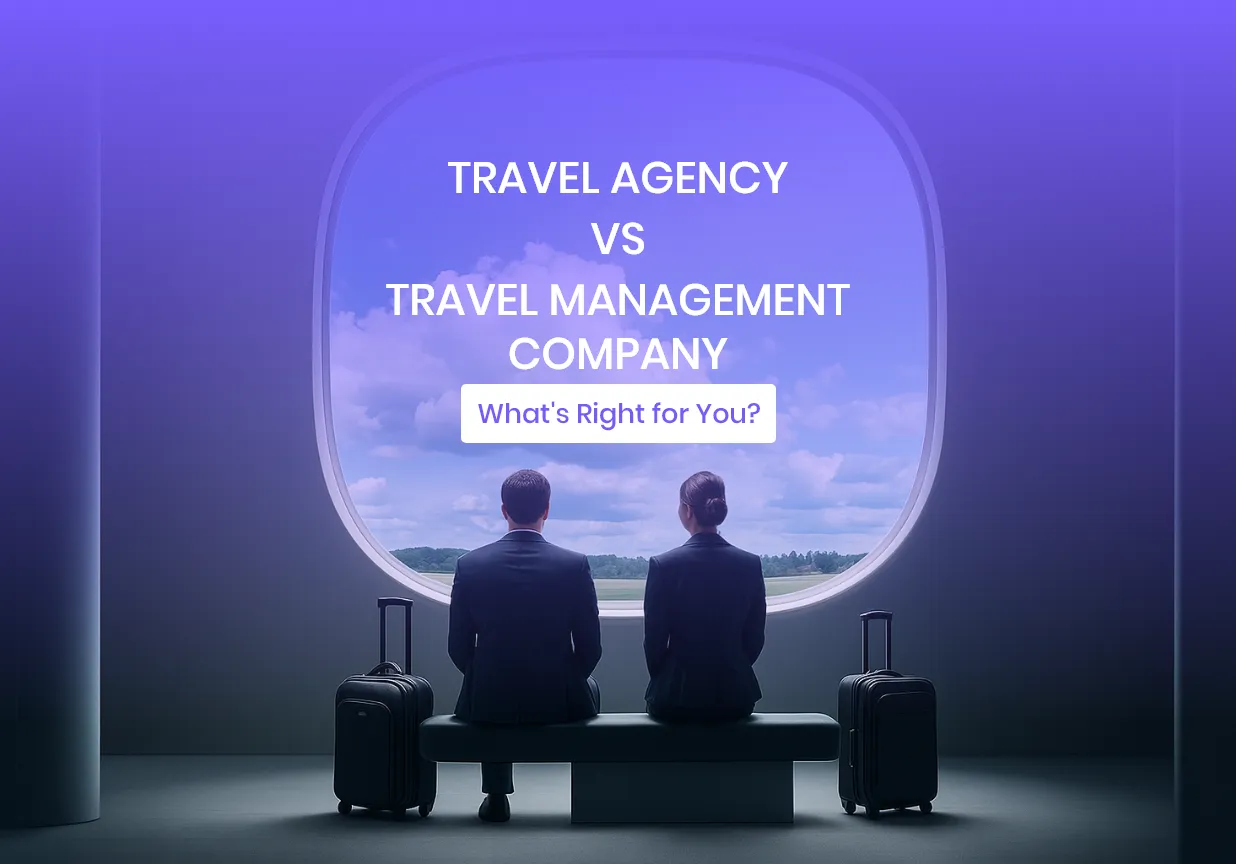Significance of Corporate Travel
Curious which is better for your business travel needs—a Corporate Travel Agent or a Travel Management Company?
In today’s dynamic world, corporate travel is indispensable as its crucial for business growth, market expansion, gaining valuable industry insights, and strengthening relationships with clients and partners. Research has found that companies that engage in corporate travel can gain a competitive edge by identifying opportunities, building stronger relationship and staying ahead of industry trends.
Companies have realised that corporate travel is a strategic investment that can significantly contribute to success by driving growth, strengthening relationships, and fostering innovation.
Corporates are also organising MICE events to boost employee productivity and team bonding. As the corporate world evolves, so does business travel, becoming more value-driven and tech-savvy. Managing business trip involves more than just booking flights, accommodations, and transportation; it also entails travel policy compliance, managing expenses, budgets, reimbursement protocols, risk management, and above all employee travel experience.
Two important verticals of Corporate Travel Management are:
- Bookings and Itinerary Management
- Travel Expense Management
When it comes to managing corporate travel, businesses typically choose between two primary options: A Corporate Travel Agent (CTA) or a Travel Management Company (TMC). While these two may seem similar at first glance, they offer distinct services, pricing models, and levels of support.
Let’s break down what sets them apart—and how to choose what’s right for your business travel needs.
Who Is a Corporate Travel Agent?
A Corporate Travel Agent is an individual or small team of professionals who help businesses book and manage travel arrangements. These travel agents often work independently or as part of a smaller agency, offering personalized service to handle flight booking and train reservations, hotel bookings, road transfers, changes, and travel issues as they arise. They also manage visa services for their clients.
Key Features of a Corporate Travel Agent:
- Personalized Service: Corporate Travel Agency (CTAs) typically provide a high level of individual attention.
- Expertise: Many agents specialize in specific industries or types of travel (e.g., international, luxury, government).
- Flexibility: More adaptable to working with small businesses or startups with limited budgets.
- Human Touch: Direct communication with the same agent or small team each time.
- Travel Expense Management: They only provide bookings and do not support travel expense management
What Is a Travel Management Company?
A Travel Management Company (TMC) is a larger organization that provides end-to-end travel services for businesses and corporates. These companies typically offer a comprehensive suite of tools, including online booking platforms, expense reporting systems, traveller tracking, and tax compliant auto invoice generation.
Travel Management Companies in India are best suited for companies with frequent travel needs and big travel budget requiring scalable solutions. They not only manage bookings and itinerary but also provide travel expense management support.
Key Features of a Travel Management Company
- Technology-Driven: Provides access to advanced booking tools, mobile apps, and dashboards.
- Data and Reporting: Detailed travel analytics and expense management tools.
- Policy Compliance: Helps enforce travel policies and automate approvals.
- 24/7 Support: Often offers round-the-clock global assistance.
- Supplier Negotiation: Leverages volume to secure better rates on air, hotel, and car rentals.
Corporate Travel Agent vs. Travel Management Company – Key Differences
| Feature/Service | Corporate Travel Agent | Travel Management Company |
| Size & Scale | Typically individual or small agency | Large, scalable organization |
| Technology | Limited or basic | Robust, includes booking tools and analytics |
| Personalization | High, one-on-one service | Moderate, more automated |
| Cost | May be lower for small volumes | Higher upfront, but cost-saving long term |
| Policy Compliance | Manual enforcement | Automated and integrated |
| Traveller Support | Personalized, but limited hours | 24/7 global support |
| Reporting Tools | Basic or none | Advanced reporting and data dashboards |
| Negotiated Discounts | Limited | Extensive due to buying power |
| Transparency | Limited | Fully transparent |
When to Choose a Corporate Travel Agent
A Corporate Travel Agent can be the right choice in the following situations:
1. Smaller Companies with Limited Travel Needs
Startups, small businesses, or companies with infrequent travel and limited travel budget often find that a CTA offers sufficient support without the cost of a Travel Management Company (TMC). The personal touch is ideal for those not needing extensive technology or analytics.
2. Need for Personalized Attention
If the executives or VIP travellers prefer working with the same person who understands their preferences, a travel agent may provide the best experience.
3. Budget Sensitivity
Without the bells and whistles of a TMC, Corporate Travel Agents (CTAs) may offer more flexible fee structures, which can be helpful for companies watching their travel spend closely.
4. Niche or Specialized Travel
Companies in industries like entertainment, fashion, or consulting may need agent’s familiar with specific logistics, destinations, or visa regulations.
When to Choose a Travel Management Company
Opting for a Travel Management Company in India is typically the right decision for larger or fast-growing organizations with complex travel needs.
1. High Travel Volume
If the company frequently sends employees across the country or globe, a Travel Management Company (TMC) can streamline processes, reduce costs, and improve efficiency through automation and bulk booking discounts.
2. Need for Centralized Control
TMCs excel at implementing and enforcing travel policies across an organization. This ensures consistency, prevents overspending, and supports duty of care obligations.
3. Data-Driven Decisions
With access to powerful analytics and reporting tools, companies can identify spending trends, negotiate better vendor contracts, and track key performance indicators (KPIs).
4. Global Reach
International operations require visa assistance, local expertise, currency considerations, and support in multiple time zones—all areas where a Travel Management Company (TMC) can excel.
5. Risk Management & Duty of Care
TMCs help organizations locate and assist travellers in emergencies, whether that’s due to weather, health concerns, or political unrest.
Pros and Cons at a Glance
Corporate Travel Agent
Pros:
- Personalized, human service
- Better for smaller budgets
- Strong relationships and attention to detail
Cons:
- Limited scalability
- Fewer technological tools
- Limited automation
- Less support for policy compliance and reporting
- Non-transparent
- Prone to cost leakages
Travel Management Company
Pros:
- Advanced tools and analytics
- Scalable solutions for growing businesses
- Streamlined policy enforcement
- 24/7 traveller support
- Centralized travel data
- Fully automated and efficient
- Completely transparent
- No cost leakages
Cons:
- Higher upfront costs
- Less personalized service
- May not be cost-effective for small teams
Hybrid Approaches: The Best of Both Worlds
Some organizations find value in combining the two approaches. For example, a Travel Management Company (TMC) might handle the broader framework—policy enforcement, data, and tech—while a Corporate Travel Agent manages VIPs or complex itineraries.
Several TMCs even offer “white-glove” or concierge services, mimicking the personalized attention of a travel agent within a scalable framework.
Final Considerations
Before making a decision, consider the following questions:
- How often do your employees travel?
- What is your annual travel spend?
- Do you require detailed reporting and expense tracking?
- How important is real-time traveller support?
- Do you need to enforce a formal travel policy?
- What kind of experience do your travellers expect?
At CoTrav, we combine the efficiency of a Travel Management Company with the warmth
and agility of a personal travel desk. Whether you’re a startup looking for flexible service or a large enterprise needing scalable automation, we’ve got you covered.
Conclusion
Choosing between a Corporate Travel Agent and a Travel Management Company comes down to your company’s size, travel frequency, and internal capabilities. A CTA is ideal for smaller teams or those who value a personalized touch, while a TMC offers the structure, technology, and support necessary for large-scale or complex travel programs.
Ultimately, the best choice aligns with your business goals, ensures traveller satisfaction, and maximizes your return on investment in corporate travel.
CoTrav has a customised solution to suit your travel needs irrespective of your business size with 24/7 relationship managers, tech-enabled booking, MICE, FRRO/VISA support.




